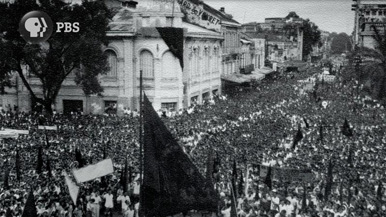TV Recap - The Vietnam War: Episode 1, Part 2
Episode 1
By Mark Light
September 25, 2017
The second half of episode one begins with a nuclear explosion, quite literally. In 1949, the Soviet Union successfully tested an atomic bomb and the American nuclear monopoly was ended. Just weeks after that, all of mainland China fell to Mao Zedong's communists. Suddenly the threat of international communism became first and foremost in American policymaker's minds. At home, political opponents of Harry Truman began to demand an answer to "Who lost China?" which looking back is a patently absurd question.
To answer the external threat of both a nuclear armed Soviet Union and a newly communist China and the internal threat of opponents accusing administrations of being soft on Communism, the US developed a simplistic Us vs Them view of the world. (This internal threat was real. Eisenhower was elected in part by saying he would be harder on communism than Truman; Kennedy was elected in part by saying he would be tougher on communism than Eisenhower). Lost in the policy views were any complexities of nationalism. We were good; the other side was evil.
In January of 1950, Mao recognized the Viet Minh as the legitimate government of Vietnam and started supplying them with arms. Truman responded by approving a $23 million aid package for the French in Vietnam. We were no longer neutral; we had chosen the colonial masters over their subjects.
Newsreel footage is used to announce the invasion of South Korea by the North Koreans in June of 1950. While this war raged with the US, South Korea, and their allies almost eliminating the North Koreans causing the Chinese to enter the war in October, quieter developments happened in Vietnam. Mao's aid had turned the Viet Minh into a serious modern fighting force, so the US sent the French transport planes and jeeps and 35 military advisors. We were now officially in Vietnam. The graphic in the film shows the amount of US aid to the French war growing from 23 million to 336 million.
In the autumn of 1951, a young Massachusetts congressman named John F. Kennedy visited Saigon on a fact-finding trip. The French commanders assured Kennedy that victory was inevitable with just more American aid. But an American journalist privately told Kennedy that the French were losing and the Vietnamese were growing to despise the Americans because of the French support.
In 1952 when Eisenhower was elected, American taxpayers were supporting 30% of the French war effort in Vietnam. In two years the amount climbed to almost 80%. Film footage of Vice-President Richard Nixon shows him making a speech on television trying to convince US citizens that spending money on the French was vital to our national security. Without calling in the domino theory, he states it mentioning protecting Thailand and Malaya.
The seventh French overall commander, Henri Navarre arrives. He says he can see victory as a light at the end of a tunnel. But, as the film states, the French public at home was growing horrified of reports of French brutality and widespread use of napalm. French troops returning home were pelted with rocks, and French leftists started calling it "La Sale Guerre," (the dirty war). Remember this, because if it doesn't sound immediately familiar, it will further along in the film.
Continued:
1
2
3
4




